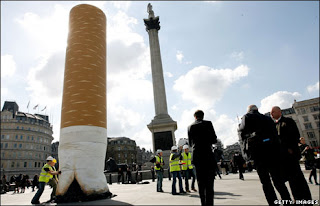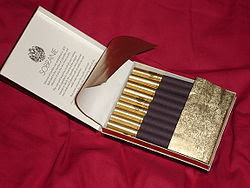
Drastic plans by Australia to become the first country to enforce plain packaging for cigarettes could cut smoking rates, and are likely to be emulated by Canada, New Zealand, and Britain, reinforcing Australia's record as a world leader in antismoking measures.
The Australian government has announced draft legislation to outlaw all logos, colors, brand imagery, and promotional text from cigarette packets. The move will “take away the tobacco industry’s final capacity to promote its product,” says John Daube, professor of public health at Curtin University’s Institute of Public Policy in Perth.
Australia has long been at the forefront of the war on tobacco. More than 20 years ago, it was one of the first countries to ban tobacco advertising, and in some states smoking has been illegal in indoor public places since 1999. For the past seven years, cigarettes have been banned from popular beaches, including Sydney's Bondi, and now a ban on smoking in apartment buildings is being considered. Cigarette packs feature graphic health warnings and images of disease.
On the packaging issue, though, the industry is gearing up for a fight. It has threatened to mount a legal challenge, claiming the legislation will infringe international trademark laws and will not reduce smoking rates. It has launched a website urging smokers to stand up for their rights, and has also enlisted retailers’ support.
A spokesman for British American Tobacco, which makes popular brands such as Dunhill and Winfield, told the Sydney Morning Herald earlier this month that it would “take every action necessary to protect … its right to compete as a legitimate commercial business selling a legal product.”
Under Australia’s plan, all cigarette packets will be a drab olive green – the least appealing color, according to research – and covered in health warnings. The brand name will appear in a standard font and position on the box, which “will now only show the death and disease that can come from smoking,” says Health Minister Nicola Roxon.
Studies suggest logos and colorful imagery decrease the effectiveness of health warnings and make cigarettes more attractive, particularly to young people. Plain packaging has been recommended by the World Health Organization, among others.
Prof. Ian Olver, chief executive of Cancer Council Australia, describes the new legislation – due to take effect next year – as “a pretty bold move … that is going to benefit not only Australia but the rest of the world, because if it’s successful, it will give a lot of other countries the impetus to do likewise.”
New Zealand has said it expects to follow suit, while Britain is closely monitoring Australia’s progress. In the past, plain packaging has also been contemplated by the European Union and Canada, with fear of legal action the main stumbling-block.
Professor Olver believes a legal challenge would fail, because, he says, trademark protection agreements contain public interest exemption clauses.
Australia already has one of the world’s lowest smoking rates –16.6 percent – but the government wants it cut to 10 percent by 2018. By comparison, in the United States, the nationwide rate is 21 percent – though only 10 percent in Utah and about 13 percent in California.
Professor Daube says: “The ferocity of the industry’s response to this move is the best evidence we can have that it’s going to be effective. They spend millions designing the packaging to be attractive. Why should they be allowed to promote a product that kills 5 million people every year?"









